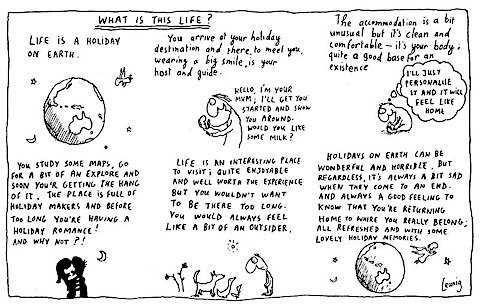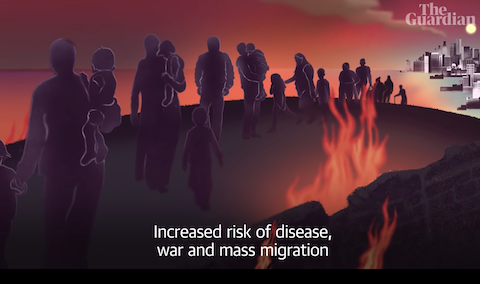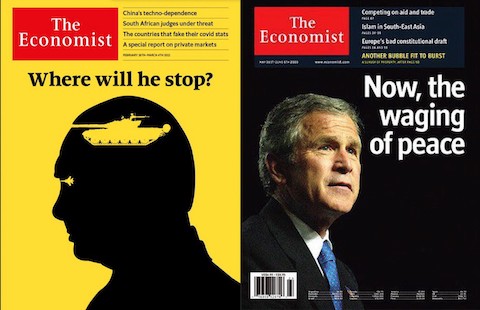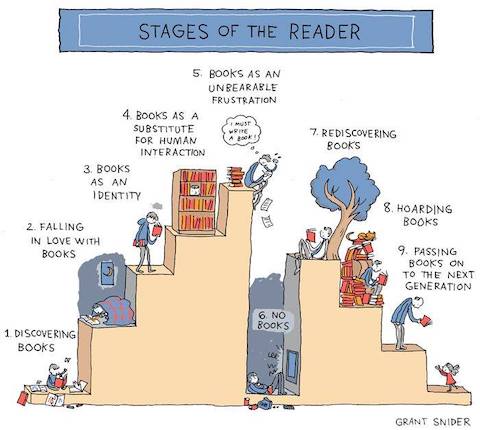
cartoon by Michael Leunig, of course
August in many countries is the month for holidays, for rest, for reflection and preparation for the slog ahead. At one time it was the month where you were most likely to see people outside, enjoying the year’s best weather. Now, it’s become the month of scurrying to get things done before the heat, the month for seeking shade, and the month for blackouts.
It’s starting. This is how it goes.
COLLAPSE WATCH

screen cap from new Guardian ‘explainer’ on climate collapse
Soon the world will be unrecognizable: Robin McKie, science editor for The Observer, writes: “The crucial point [according to climate scientist Bill McGuire] is that there is now no chance of us avoiding a perilous, all-pervasive climate breakdown. We have passed the point of no return and can expect a future in which lethal heatwaves and temperatures in excess of 50C (120F) are common in the tropics; where summers at temperate latitudes will invariably be baking hot, and where our oceans are destined to become warm and acidic.” Countering some of the climate scientists he knows who are afraid to tell the truth, Bill says:
In confidence, they are all much more scared about the future we face, but they won’t admit that in public. I call this climate appeasement and I believe it only makes things worse. The world needs to know how bad things are going to get before we can hope to start to tackle the crisis.
Richard Heinberg’s defensive pessimism: “The most helpful attitude from here on will be a refusal to accept the inevitability of the very worst outcomes. It is a stubborn insistence on imagining alternatives to growth and working hard to realize them—while acknowledging that most of our existing technological and social structures were designed during the era of expansion and will likely fail under conditions that are now emerging… This century, as those centralized systems fail due to lack of energy, broken supply chains, and the consequences of climate change, new grassroots social structures will need to spring up to meet basic community needs.” He goes on to list the types of new structures this will require.
Blistering summers are the future: “Will our children grow up being scared of summer?” Thanks to John Whiting for the link.
Rainwater everywhere is unsafe to drink: New guidelines for toxic human-made chemicals that never degrade suggest that rainwater everywhere on the planet is now unsafe to drink. Thanks to Kavana Tree Bressen for the link.
Sri Lanka continues to be the canary in the mineshaft: Building on last month’s series of articles, Indrajit Samarajiva explains what is happening there:
Now that global empire—standing athwart history yelling ‘stop!’—is collapsing, its two legs of capitalism and democracy are both crumbling. In Sri Lanka you can see them fall. But don’t take my word for it. Read (non-vulgar) economist Michael Hudson’s article, The End of Western Civilization. It tells you a lot about where we are. [Michael’s article is a long read, but it’s important. It explains why economic collapse will precede ecological collapse, leading to the end of our human civilization. Indrajit goes on to explain how this is playing out there now. And in a separate article, he describes the overwhelming mental illness that accompanies the fall.]
LIVING BETTER

stones glued on canvas; from Relax It’s Only Art, original source and artist Marksense
Our epidemic of malnutrition: David Oke describes the source of the failings of our industrial food and medical systems, that have led to less healthy lives even as medical costs spiral out of control, and suggests some solutions (thanks to Flatcaps and Fatalism for the link, and the one that follows):
The twentieth-century shift in mortality from infectious to noncommunicable disease—what demographers call the “epidemiological transition,” linked to the “nutrition transition” that reshaped global diets—largely eradicated diseases like polio and yellow fever, but it did not lead to conditions of general health. Instead, it created populations that are chronically ill, and thus require near-constant medical attention; in turn, healthcare systems shifted from treating acute diseases to managing populations that are permanently, but “manageably,” ill. More medicine than ever, but less health.
Seventeen theses on disability: Freddie deBoer’s blunt and powerful explanation of the realities of disability and how modern identity politics makes everything worse for those actually dealing with it.
The possibility of direct democracy: Indrajit explains how political collapse in Sri Lanka has given its citizens a brief taste of what a system of real, direct democracy might look like.
Free up doctors (and pharmacists) to prescribe safe drugs to replace street drugs: Canada’s associate Minister of Health seems to finally get it. Sadly, her boss and her department are still resisting the radical changes needed to address Canada’s toxic street drug death toll, which remains higher than our CoVid-19 death toll each year, and is still rising.
POLITICS AND ECONOMICS AS USUAL

propaganda posters used as covers by The Economist; exposé by Indrajit Samarajiva
Patrick Lawrence on the decline of western media: The long-time foreign correspondent writes passionately, articulately and courageously (enough that Twitter has “cancelled” him) about how media once devoted to critical thinking and investigative reporting have become zealous scribes and propagandists for western political and corporate interests. Some recent examples of his work:
- On the brutality and deceit of the Zelenskyy regime in Ukraine, the western media’s fawning fealty to him, an explanation of how the Ukraine war actually arose, Biden’s outrageous kowtowing to Israel’s and Saudi Arabia’s murderous governments, and the “egregious case of Julian Assange”.
- On the deliberate omission of history, context, responsibility and causality in the western media’s reporting on current events, and on the end of “the American Century”.
- On the capitulation of Amnesty International and CBS, censoring (but not denying) their own reporters’ unfavourable assessments of Ukraine’s human shield strategy (firing missiles from schools and hospitals) and the disappearance of most American weapons sent to Ukraine into the country’s (and world’s-largest) arms black market, after the Ukrainian government complained.
- Patrick links to this on-the-ground journalism by Canadian foreign correspondent Eva Bartlett, describing the Ukrainian army’s use of thousands of illegal butterfly mines to terrorize citizens in the Russian-controlled Donbas region. Of course, since she is shunned and banned by western media, only RT published her story.
Noam Chomsky and the larger picture: Speaking of history and context, Noam (another guy who’s basically blacklisted from western mainstream media) is taking every opportunity he can to provide some clarity and background on what is happening, especially when it comes to ecological collapse. Some of his recent takes:
- On the two defining crises of our time, ecological collapse and the threat of nuclear weapon deployment. Citizens are not even asked or told much about these crises, and when they are asked, the citizens say they believe the risks are small. This broad misunderstanding has potentially catastrophic consequences.
- On ecological collapse and the Vile Maxim (“all for ourselves and none for others”).
- On class warfare, neoliberalism and viable alternatives. Some alternative ways of doing things are being tried. It’s unlikely that they will be implemented on any scale, but still.
It’s not hypocrisy, you’re just powerless: NS Lyons is the pseudonym for an established conservative commentator, who often addresses conservative conferences. When I first stumbled on his recent satirical article about castism/classism, I thought it was written by a leftie lamenting the stranglehold on power held by the war-mongering, corporatist, fuck-the-environment white empire that controls all the major parties in the west, leaving the left as a powerless “Class B”. It was only when I read further (including the comments and some of his other writings) that I discovered that his Class A is actually “Woke” America, which apparently includes all liberals, universities, uppity minorities, the angry poor, criminals, atheists and other non-Christians, illegals, and soft-on-crime Democrats. His poor oppressed Class B? Aggrieved over-taxed capitalists, Republicans, Christians, conservatives, and the working class. Mind-bending.
Corpocracy, Imperialism & Fascism: Short takes:
- Caitlin Johnstone asks when foreign governments (and others) might start clamouring to speak to those who really have the power in the US/White Empire. And she also wonders how long we can allow dementia sufferers* like Nancy Pelosi to run amok threatening nuclear disaster.
- Why the US should rewrite its constitution, as Chile is doing. Thanks to John Whiting for the link and the four that follow.
- How the US “Supreme” Court could strip state judiciaries from ruling on state laws.
- Why the US, Saudi Arabia and Israel are plotting war with Iran
- How AIPAC, a right-wing Israeli lobby group, is meddling in Democratic Party primaries
- Robert Reich reveals how many right-wing extremist politicians came from Harvard and Yale
- John Bolton openly admits planning multiple foreign coups
- Journalist-researcher Pedro Gonzales digs into Zelenskyy’s brutal crackdown on opponents, his legacy of corruption and his connection to criminal oligarchs
Misinformation, Disinformation, Censorship & Propaganda: Short takes:
- Indrajit Samarajiva reviews The Economist’s long history of imperialist propaganda, including the jaw-dropping propaganda posters that it has long used as cover art
- How Facebook recruits most of its Ukraine War “fact-checkers” from US-funded anti-Russian propaganda agencies like the notorious National Endowment for Democracy
CoVid-19 continues to rage on, out of control: Short takes:
- Verbatim from last month: Nothing has changed. Deaths and hospitalizations are continuing at the same pace as the previous two summers, and wave 7 has begun. This fall and winter could be as bad, in death toll, as the previous two horrific winters (waves 3 and 5), when US deaths were running at over 3,000/day and global deaths over 15,000/day. Most of the hospitalized and dying continue to be older and immune-compromised people, though there’s now a huge spike in reinfections, sometimes mere weeks apart, as the effect of vaccines continues to diminish as variants get ‘smarter’. So the advice is the same: mask indoors and in crowded places, get all the shots you can, and test, trace and isolate when you or loved ones get symptoms.
- Biden abandons the last of the US’s metrics and preventative measures for dealing with CoVid-19
- Indrajit outlines the four lies that allowed CoVid-19 to kill and sicken so many millions
- A CoVid-19 sufferer laments our incapacity to allow time for rest and recovery; thanks to Kavana Tree Bressen for the link.
*In their own words: Terrifying excerpts from recent actual speeches made by senescent US leaders. The US desperately needs a mental competency test for its current and aspiring political leaders:
- Nancy Pelosi: “In our earliest days at our founding of our country, Benjamin Franklin, our presidency, said, freedom and democracy. Freedom and democracy, one thing, security here. If we don’t have- we can’t have either, if we don’t have both.”
- Joe Biden: “[I have] made it clear that no American president, at least one did, but no American president had ever backed down from speaking out of what’s happening in the Uyghurs… So I see stiff competition with China. China has an overall goal, and I don’t criticize them for the goal, but they have an overall goal to become the leading country in the world, the wealthiest country in the world and the most powerful country in the world. That’s not going to happen on my watch because the United States is going to continue to grow and expand.”
- Donald Trump: “Look, having nuclear — my uncle was a great professor and scientist and engineer, Dr. John Trump at MIT; good genes, very good genes, OK, very smart, the Wharton School of Finance, very good, very smart — you know, if you’re a conservative Republican, if I were a liberal, if, like, OK, if I ran as a liberal Democrat, they would say I’m one of the smartest people anywhere in the world — it’s true! — but when you’re a conservative Republican they try — oh, do they do a number — that’s why I always start off: Went to Wharton, was a good student, went there, went there, did this, built a fortune — you know I have to give my like credentials all the time, because we’re a little disadvantaged — but you look at the nuclear deal, the thing that really bothers me — it would have been so easy, and it’s not as important as these lives are — nuclear is so powerful; my uncle explained that to me many, many years ago, the power and that was 35 years ago; he would explain the power of what’s going to happen and he was right, who would have thought? — but when you look at what’s going on with the four prisoners — now it used to be three, now it’s four — but when it was three and even now, I would have said it’s all in the messenger; fellas, and it is fellas because, you know, they don’t, they haven’t figured that the women are smarter right now than the men, so, you know, it’s gonna take them about another 150 years — but the Persians are great negotiators, the Iranians are great negotiators, so, and they, they just killed, they just killed us, this is horrible.”
FUN AND INSPIRATION

cartoon by John Atkinson
The ability to see what’s useful and what is not: Interesting review of David Foster Wallace’s writing and the “attempt to make art moral”.
Why there are no stock market experts: Canadian YouTuber Veritasium defines the four things it takes to be an expert, and explains why when it comes to complex systems, there can be no experts. (They are: A ‘valid’, predictable, rules-based, finite-variables environment; Many repetitions to learn from mistakes; Timely feedback on where you’ve made mistakes; Deliberate practice focused on areas where you most need improvement.) Also from Veritasium, Fritz Haber, the man who killed millions (chemical poisons) and saved billions (chemical fertilizers).
Lost letters of the alphabet: How English jettisoned some letters you still see traces of in old documents.
They’re lying to us: From reader and friend Djô Rudigoz, a brilliant French protest song by Gérard Manset. Also from Djô: A song from Phoenix backed by animated art classics. And from there: Stunning CGI visuals to a song by Sagans.
How some people learn just from YouTube demos: An astonishing dub-step performance by a young woman, entirely self-taught.
Road signs for your co-workers: A clever “re-working” of common road signs.
What you dance to: For me, it’s Haitian Kompa/Zouk music and K-POP. For my friend Dave Smith, author of the wonderful To Be Of Use, it’s self-composed Electro-Swing.
The essence of all great music is surprise: Rick Beato explains how to achieve it.
Learning to compose music: Canadian pianist-composer Nahre Sol demonstrates some useful time-constrained exercises.
How to survive a heatwave: Cartoonist First Dog On the Moon tells us how, hilariously. Advice for Brits, but it applies to us all. Thanks to Hilary Neilson for the link.
THOUGHTS OF THE MONTH

cartoon by Grant Snider from I Will Judge You By Your Bookshelf
From Caitlin Johnstone, Trapped in the Slaughterhouse:
Western civilization is a story of full bellies and starving hearts. Of a feast of information and a famine of truth. Of conveyor belts churning out processed food, conformity-enforcing media and power-serving culture. Enough food to stay alive but not enough sustenance to live.
They keep us alive but they don’t let us live. They give us enough carbohydrate to turn the gears of industry, but they keep us too busy, poor, propagandized, confused and crazy to actually drink from the waters of life. To actually experience the beauty of this world. To let the crackling potentiality of advanced terrestrial life blossom to fruition within us.
The modern empire rules us by filling our markets with Wonder Bread and our schools and media with lies. By filling our bellies and starving our souls. By churning out mountains of useless landfill without ever producing anything of real value. By making more while providing less.
They improve food production and medicine just enough to lengthen our lifespans, only so that they have more life to drain us of. They let us populate the earth with more humans only to drain us of our humanity. We’re not people to them. We are batteries. We are fuel.
This is no civilization. It’s a slaughterhouse. A fake plastic performance staged to funnel human life into the gears of an insatiable machine. A fake plastic culture designed to keep us on the conveyor belt so that our life force can be converted into fuel for a soulless empire. A fake plastic society built to keep us marching into the food processor.
From Indrajit Samarajiva, on Protest and Democracy:
The ruling classes have tried their best to bury the People’s Assembly, but it’s still there, and it still spontaneously reforms in town squares when it’s needed. We have to look deeper at our democracies and really struggle to constitute them beyond a constitution. We have to fight for them, we have to question them and we have to quite honestly tear liberal democracy up and start over, from first principles. We’ve also got to get rid of this idea that there’s one perfect form of democracy for all and that white people found it and can bomb it into everyone. Democracy is a constant struggle, an Aragalaya in Sinhala. The struggle must go on.
From my friend PS Pirro, It’s Just What Was:
Yesterday I spent time on the Abandoned America website, scrolling through images of places that are no longer one thing but are not yet something else. Shopping malls and amusement parks and roadside attractions re-absorbing into the body of the world. I’ve heard people denigrate these images as ruins porn. Yet nobody calls it ruins porn when we visit the Roman Coliseum. We call that cultural enrichment.
Maybe we’re too close, maybe it’s too soon. We walked through those malls. We worked in those factories. It wasn’t great. It’s just what was, and now it isn’t anymore.





Here’s a good overview of the Inflation Reduction Act (the US climate change bill that, amazingly, passed Congress the day you posted this and will be signed into law today): https://www.youtube.com/watch?v=qw5zzrOpo2s
I’d love to see you post about how this remarkable step affects your thoughts about the likely severity of future climate change/collapse?
This was indeed a remarkable occurrence. And as a vlogbrothers subscriber, I absolutely love Hank’s video that you’ve linked to.
As Hank says in the video, this is just a tiny start, a rocky step back from the brink. But we’ll take what we can get.